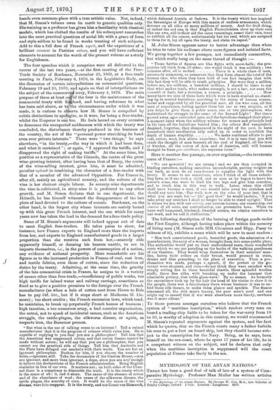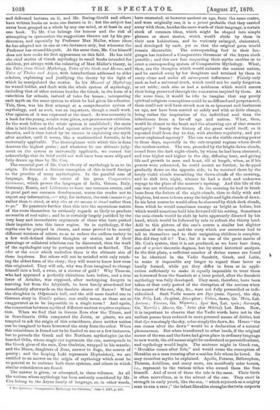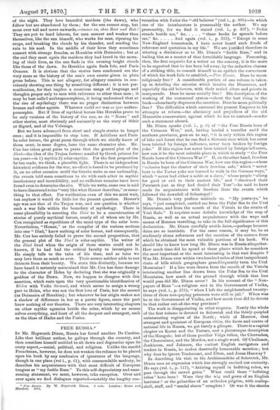MYTHOLOGY OF THE ARYAN NATIONS.*
THERE has been a good deal of talk of late of a system of Com- parative Mythology. Professor Max Muller has written articles 7'he Mythology of the Aryan Nations. By George W. Cox, MA., late Scholar of Trinity College, Oxford. 2 role. London : Longmans. 1870.
and gislivered lectures on it, and Mr. Baring-Gould and others have written books on some one feature in it ; but the subject has never been grasped as a whole by any one mind, or at least in any one book. To Mr. Cox belongs the honour and the risk of attempting to systematize the suggestions thrown out by his pre- decessors, and especially by Professor Max Miller, whose ideas he has adopted not in one or two instances only, but wherever the Professor has crossed his path. At the same time, Mr. Cox himself does not here make his first appearance on this field. He has told the chief stories of Greek mythology in small books intended for children, yet always with the colouring of Max Milner's theory, in his Tales from Greek Mythology, Tales of the Gods and Heroes, and 'Tales of Thebes and Argo; with introductions addressed to older scholars, explaining and justifying the theory by the light of which he manipulated the stories. In his Manual of Mythology be waxed bolder, and dealt with the whole system of mythology, including that of other nations besides the Greek, in the form of a -catechism for schools, instead of tales for homes ; interpreting cull myth on the same system to which he had given his adhesion. 'This, then, was his first attempt at a comprehensive system of mythology, and as such, was an important, though a small work. 'Our opinion of it was expressed at the timet. As was necessary in -a book for the young, results were given, not processes nor criticism. In the work before us the whole system is established ; the main idea is laid down and defended against other popular or plausible theories, and is then tested by its success in explaining one myth after another, until it seems, like a mathematical formula, to be universally applicable. The thoroughness with which this is done deserves the highest praise ; and whatever be our ultimate judg- ment on the system as universally applicable, we cannot but -acknowledge that its brief could not well have been more ably and fully drawn up than by Mr. Cox.
The essential part of Mr. Cox's theory of mythology is as to its -origin. To demand a distinct conception of this is itself foreign to the practice of many mythologists. In the parallel case of language, Bopp, at the outset of his great Comparative 'Grammar, which proves the languages of India, Greece, Italy, Germany, Russia, and Lithuania to have one common source, and in great part one common development, warns the reader not to -expect any information,—" why, for instance, the root i means to go rather than to stand, or why stha or sta means to stand rather than 40 go." To penetrate further than this into the mysterious nature -of the roots themselves he evidently regards as likely to produce no results of real value ; and he is certainly largely justified by the -very hazy and inconclusive arguments of those who have pushed their inquiries into this inner region. So in mythology, if the myths can be grouped in classes, and some proved to be merely -different versions of others, so as to reduce the endless variety to -a few well-defined distinct thoughts or stories, and if their ,parentage or collateral relations can be discovered, then the work -of the mythologist may be perhaps considered as finished. The -idea or the event which underlies them is the ultimate aim of these inquirers. But others will not be satisfied with only reach- ing the oldest form of the story; they will want to know how even this originated. They will ask, why WAS Zeus imagined to change limself into a bull, a swan, or a shower of gold ? Why Theseus, who had appeared a perfectly chivalrous hero before, and a true slover of Ariadne, was supposed, after undergoing dangers in 'rescuing her from the labyrinth, to have basely abandoned her -immediately afterwards on the desolate shores of Naxos? What the slaughter in Odysseus's hall, and the still more fearful one in 'German story in Etzel's palace, can really mean, as these are so 'exaggerated as to be impossible in a single room ? And again, the connection between myths of different nations requires explana- tion. When we find that in Greece Zeus slew the Titans, and in Scandinavia Odin conquered the Jiitun, or giants, we are tempted to ask the origin of this coincidence, since neither nation -can be imagined to have borrowed the story from the other. When this coincidence is found not to be limited to one or a few instances, but to pervade the Greek and the Northern mythologies (as the bearded Odin, whose single eye represents the sun, corresponds to the Greek giver of the rain, Zeus Ombrios, wrapped in his mantle; -and the Muses, daughters of Zeus, answer to Saga, the source of poetry ; and the limping Loki represents Hephaistos), we are -entitled to an answer on the origin of mythology which must be so general as to embrace both these systems, and others in which
coincidences are found.
The answer is given, or attempted, in these volumes. As all the nations whose mythology has been seriously considered by Mr. Cox belong to the Aryan family of language, or, in other words,
See Spectator, " Comparative Mythology for Children," June 1, 1867, p. 613.
have emanated, at however ancient an age, from the same centre, and were originally one, it is a priori probable that they carried away with them, besides the mere words of their language, a certain stock of common ideas, which might be shaped into simple phrases or short stories, which would abide by them in their new habitations, and be variously enlarged, elaborated, and developed by each, yet so that the original germ would remain discernible. The corresponding fact in their lan- guages has rendered a Comparative Grammar of the Aryan stock possible ; and this new fact respecting their myths enables us to erect a corresponding system of Comparative Mythology. What, then, are the thoughts which would animate the ancient nation, and be carried away by her daughters and retained by them in every clime and under all subsequent influences ? Plainly only such as had a universal truth, which could not be easily forgotten or set aside ; such also as had a nobleness which would ensure their being preserved through the veneration inspired by them. At the same time, it would be idle to imagine that any purely' spiritual religious conceptions could be so diffused and perpetuated; these could not well have struck root in so ignorant and barbarous an age, nor have been carried so safely and with so little change, being rather the inspiration of the individual soul than the inheritance from a far-off age and nation. What, then, would lie closest to the heart and the observing eye of that remote antiquity ? Surely the history of the great world itself, as it repeated itself from day to day, with absolute regularity, and yet never-explained mystery? The sun was the visible creating power in those days, especially in the sub-tropical regions where dwelt the mother-nation. The sun, preceded by the bright dawn-clouds, issued from the dark night-clouds, by whom he had been obscured ; and rose higher and higher in the sky, diffusing heat, and giving life and growth to man and beast, till at length, when, as if his powers were exhausted, he could mount no further, he dropped gradually down on the opposite side, to be received there by the lovely violet clouds resembling the dawn-clouds of the morning, and to sink into night, whence he had a dark and unknown voyage to the place of the morrow's uprising. And this life of the sun was not without adventure. In the morning he had to break loose from the fetters of the night-clouds, then to dally with and brighten, but soon to burn away the bright and light clouds of dawn. In his later course he would often be obscured by thick dark clouds, from which he would sometimes emerge as bright as before, but which would sometime hold him fettered till his setting. Sometimes the rain-clouds would be cleft by bolts apparently directed by his hand, which would be followed by rain to refresh the thirsty land. Add to this picture of the sun's course a similar but slighter mention of the moon, and the story which our ancestors had to tell to themselves and to their emigrating children is complete. But did they tell it ? Yes ; for it is one of the great merits of Mr. Cox's system, that it is not produced, as we have here done, out of a priori theoretic dogmas, but by strict historical analysis. In the first place, a sufficient number of divine names are found to be identical in the Vedic Sanskrit, Greek, and Latin, to make it impossible any longer to regard these latter as locally formed, while yet they differ in form or in appli- cation sufficiently to make it equally impossible to treat them as borrowed from the Sanskrit at a later period, after the Sanskrit mythology was fully developed. They must, therefore, have been taken at that early period of the disruption of the nations when the names of the sun, sky, &c., were not fully personified or indi- vidualized. Such Vedic names are Dyu (nom. Dyaus), the sky, Gr. ZEO;, Lat. Ju-piter, Dies-piter ; Ushas, dawn, Gr. 'HEL5, Lat. Aurora ; Varuna, Gr. 05pavo; ; Agni fire, Lat. ignis ; Saranye., Gr. 'Epniy6; ; Maria, Gr. Apn5 (for M4pu), Lat. Mars. Now, it is important to observe that the Vedic words have not in the earliest poems been reduced to mere personal names of deities, but that dyu was simply the sky, ushas simply the dawn, &c. Hence "the sun comes after the dawn" would be a declaration of a natural phenomenon. But when transferred to other lands, if the original names of the sun and the dawn had given place in ordinary language to new words, the old names might be understood as personifications, and mythology would begin. The sentence might in Greek run, " Herakles comes after Iole," and would rouse the conception of Herakles as a man running after a maiden Iole whom he loved. So may countless myths be explained. Apollo, Perseus, Bellerophon, Theseus, Achilleus, and many more, are manifestly solar heroes, i.e., represent to the various tribes who owned them the Sun himself. And of most of them the tale is the same. Their birth is often marvellous, as is the advent of the sun. They excel in strength in early youth, like the sun, "which rejoiceth as a mighty man to run a race ;" the infant Herakles strangles the twin serpents of the night. They love beautiful maidens (the dawn), who follow but are abandoned by them ; for the sun cannot stop, but must ever toil and move onwards,—inuner zit, ohne Ras t und Ruh! They are put to hard labours, for men meaner and weaker than themselves, like the sun himself, who works for man, ripening his crops, and breaking the clouds by his thunder, and sending the rain to his seed. In the middle of their lives they sometimes consort with strange females, as Herakles with Deianeira ; but at the end they meet again the maidens they had loved in the morn- ing of their lives, as the sun finds in the evening bright clouds like those of the dawn. So Herakles again finds Iole, and Paris Oenone. It is obvious that the stories here condensed are the very same as the history of the sun's own course given in plain prose before. This is not allegory, for allegory consists in con- sciously showing one thing by something different ; it is not per- sonification, for that implies a conscious usage of language and thoughts proper only to men with reference to other than men ; it may be best called anthropomorphism, it being understood that at the rise of mythology there was no proper distinction between human and other agents. Whatever could act was eo ipso anthro- pomorphic. But if lives of mythical heroes like Herakles prove to be only versions of the history of the sun, so do " Norse " and -other stories, most obviously and eminently so the story of Sifrit -or Sigurd, and of the Volsungs.
But we have advanced from short and simple stories to longer -ones ; and it is impossible to stop here. If Achilleus and Paris be solar heroes, the great poem through which we chiefly know of them must, in some degree, have the same character also. Mr. Cox has taken great pains to prove that the general plot of the lliad—the idea of the Trojan fortress assailed by Greek princes for ten years—is 1) mythic 2) solar-mythic. For the first proposition be has made, we think, a plausible fight. There is no independent -historical evidence for the war, no effect is found to be produced by it, on no other occasion could the Greeks unite as one nationality, the events told seem sometimes to vie with each other in mythic incoherency and incredibility, and no sufficient remains have been found even to determine the site. While we write, some one is said to have discovered ruins "very like what Homer describes," or some- thing to that effect. For verification even of this we must wait, but anyhow it would do little for the present question. Homer's -age was not that of the Trojan war, and our question is whether such a war falls within the boundary of mythology. There is -some plausibility in asserting the Riad to be a concatenation of stories of purely mythical heroes, nearly all of whom are by Mr. Cox recognized as repetitions of the usual type of the solar hero. Nevertheless, "Homer," or the compiler of the various sections into one "Iliad," knew nothing of solar heroes, and consequently, Mr. Cox has entirely failed to prove the second proposition, that the general plot of the Iliad is solar-mythic. The writer of the Iliad lived when the origin of these stories could not be known, if he had had the critical faculty to investigate it. He simply tells us the tales of his time, and as tales we may love them as much as ever. Their source neither adds to nor detracts from their beauty. We state this distinctly, because we -have heard it seriously maintained that Mr. Cox has done damage to the character of Helen by declaring that she was originally a goddess of the Dawn. Now, we happen to disagree with this assertion, which rests upon the very questionable identification of EMI'S with Vedic Saramd, and which seems to assign a wrong part to Helen, who was not the first love of Paris, but the second (as Deianeira of Herakles) ; but whatever be her origin makes not a shadow of difference in her as a poetic figure, since the poet -.knew nothing of our theories. There are very interesting chapters on other mythic agencies beside the solar, which by no means -solves everything, and least of all the deepest and strangest, such -as the ideas of Hades and the Furies.
































 Previous page
Previous page